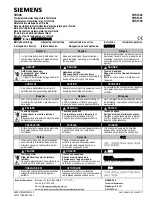
BE1-51/27R - Maintenance
6-1
CAUTION
Substitution of printed circuit boards or individual components does not necessarily mean
the relay will operate properly. Always test the relay before placing it in operation.
SECTION 6 • MAINTENANCE
GENERAL
BE1-51/27R Time Overcurrent Relays require no preventive maintenance other than a periodic operational
test (refer to Section 5 for operational test procedure). If the relay fails to function properly and factory repair
is desired, contact the Customer Service Department of the Power Systems Group, Basler Electric, for a
return authorization number prior to shipping.
IN-HOUSE REPAIR
In-house replacement of individual components may be difficult and should not be attempted unless
appropriate equipment and qualified personnel are available.
Replacement parts may be purchased locally. The quality of replacement parts must be at least equal to
that of the original components. Where special components are involved, order these parts directly from
Basler Electric. When complete boards or assemblies are needed, the following information is required.
1. Relay model and style number
2. Relay serial number
3. Board or assembly
a) Part number
b) Serial number
c) Revision letter
4. The name of the board or assembly.
STORAGE
This protective relay contains aluminum electrolytic capacitors which generally have a life expectancy in
excess of 10 years at storage temperatures less than 40
C. Typically, the life expectancy of the capacitor
is cut in half for every 10
C rise in temperature. Storage life can be extended if, at one-year intervals, power
is applied to the relay for a period of thirty minutes.
TEST PLUG
Test plugs (Basler part number 10095 or G.E. part number XLA12A1) provide a quick, easy method of
testing relays without removing them from their case. Test plugs are simply substituted for the connection
plugs. This provides access to the external stud connections as well as to the internal circuitry.
Test plugs consist of black and red phenolic moldings with twenty electrically separated contact fingers
connected to ten coaxial binding posts. Fingers on the black side are connected to the inner binding posts
(black thumb nuts) and tap into the relay internal circuitry. Fingers on the red side of the test plug are
connected to the outer binding posts (red thumb nuts) and also connect to the relay case terminals.



































